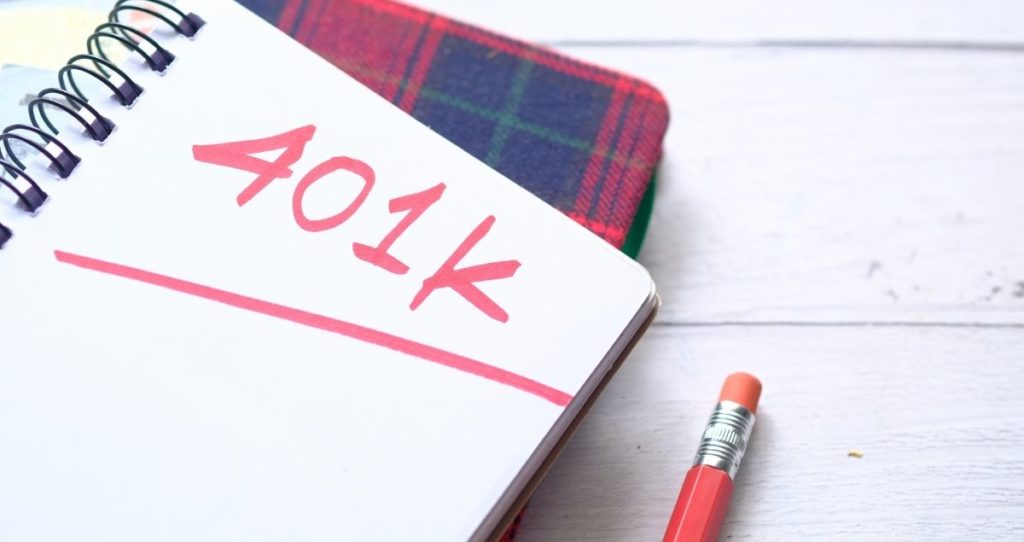Having a job with great benefits such as a 401(K) is very important for your career, financial stability, and saving for retirement. Even if you have a great job with the best benefits, however, there is no guarantee that you will work in the same job until you retire. A time will come and you will move on. As much as you save for retirement through your 401(k) plan, you should also understand what happens to your 401(k) when you quit your job.
Typically, you will have 4 options on what to do with your 401(k) when you quit your job. You can either roll your 401(k) into your new employer’s plan, cash out your 401(k), keep it with your former employer, or roll it into an IRA.
If you end up quitting your current job before you are fully vested, you might lose all or a portion of your employer’s match to the plan. Most employers have different vesting schedules where the employer’s contribution to the plan is awarded to you in incremental percentages such such 25%, 50%, 75%, and 100%, the longer you stay with the company. So, quitting early could mean losing some of these funds.
If you need to know what happens to your 401(k) when you quit your job in more detail, keep reading.
What is a 401(K)?
A 401(K) is a tax-advantaged retirement plan that many employers offer to their employees as part of their benefits packages. When you sign up for a 401(K) plan, you contribute a pre-tax portion of your paycheck to the plan through payroll deduction. Additionally, your employer might match your contributions by a certain percentage. With a 401(k), you defer paying taxes until you are taking distributions during retirement.
What makes a 401(k) superior to other retirement savings plans such as IRAs is that it comes with higher contribution limits, gives you direct tax benefits, and lets you grow your nest egg on a tax-deferred basis. This strategy allows you to increase your retirement savings and grow your net worth faster than other investment strategies available in the market.
You might also like: How to invest without losing money: Investing guide for newbies
What happens to your 401(K) when you quit your job?
One of the biggest myths about 401(k) plans is that many people think they will lose their 401(k) when they quit their jobs. This is not true because your 401(k) money follows you every time you change employers. All you have to do is to decide where you want to money to go and which account. For example, if you quit your job and never get hired again, you can easily keep your 401(k) with your former employer, roll it into an IRA, or cash it out. On the other hand, if you end up getting another job, ask your old employer to do a direct rollover into the new 401(k) plan with your new company to avoid tax liabilities.
What happens to my 401(k) when I leave my current job?
Let’s assume that you have a 401(K) plan with your company and you want to quit for a new job. Since you are leaving your job, a decision as to what will happen to your 401(K) plan must be made.
The following are different options for what will happen to your 401(K) when you quit your job, according to Fidelity Investment.
1. Leave your 401(K) plan with your former employer
With this option, you will let the money stay in the account you opened with your former employer. Keep in mind that some employers might write you a check if the account is small(under $5,000).
The downside of keeping your 401(k) plan with your former employer is that you cannot make additional contributions to the plan. Without adding more money to the plan, your account grows slowly and most of your ROI will be eaten by your plan’s fees.
2. Rollover your 401(K) to your new employer’s 401(K)
If you find another job and you are eligible for a 401(K) with your new employer, roll over your 401(K) balance into your new employer’s plan. Your account must be active before you move the money into the new 401(K) account. With this process, you will have two options.
- Direct rollover. With this option, the administrator of your old account will deposit your funds into your new 401(K) account.
- Indirect rollover. With this option, your former employer will send you distributions as checks and these checks must be deposited into your new 401(K) within 60 days. Failure to deposit these checks will result in an early withdrawal and you will pay tax and a 10% penalty.
3. Rollover your 401(K) into your IRA accounts
There are chances that your new employer will not have a 401(K) plan. In this case, your option will be to open an individual retirement account(IRA) and roll over the money in that account. This account will be managed by you and you will have a wide range of investment options.
With an IRA, you can easily invest in stock funds such as Index Funds, Mutual Funds, and Exchange-Traded Funds(ETFs). Additionally, IRAs allow you to invest in other securities and assets such as bonds, individual stocks, REITs, deposit accounts, etc. IRAs also come with fewer fees compared to excessive fees associated with 401(k) plans.
If you rollover your 401(k) into a Roth IRA, you will pay applicable tax for the entire amount. However, from that moment on, your account will grow tax-free and you will not pay taxes on your distributions during retirement. If you go with the Roth IRA option, make sure that you will not need access to your funds within 5 years. IRS applies a 10% penalty when you take withdrawals from a Roth IRA before you turn 59½ and have not owned the account for at least 5 years. The only exception to this rule is when you are taking money for college, first home buyers, or disability.
You might also like: How to invest in dividend stocks without losing money in the stock market.
4. Cashout your 401(K)
Unless you are in a lot of financial struggles, you should never consider this option. Never cash out your 401(k) unless it is the last option.
Although it is possible, you should never cash out your 401(K) when you quit your job. This is because cashing out your 401(k) will result in an early withdrawal of the money which triggers tax liability and a 10% penalty and taxes on the entire distribution. As a result, you will end up losing most of your money unless you are 59 1/2 years old.
How much can you contribute to your 401(K) in 2024?
Your 401(K) is one of the best retirement plans and wealth-building strategies you should pay attention to if your employer provides it. With a 401(k) plan, you will make contributions with pre-tax wages and receive free money from your employer through contribution matching.
Since this is a tax-advantaged account, there is a limit to how much you can contribute to your 401(K). Without 401(k) contribution limits imposed by the IRS, people would evade taxes by hiding all their taxable incomes in 401(k)s. So, what are the 401(k) contribution limits in 2024?
According to the IRS, the contribution limits for a 401(K) in 2024 are $23,000 and $30,500 for people who are 50 or older. The extra contributions are permitted for older people as a yearly catch-up contribution. For 2023, you can contribute as much as $22,500 to your 401(k) and an extra $7,5000 if you are 50 or older.
How much should I contribute to my 401(K) account?
Do you have a 401(K) plan but have no idea how much you should contribute to the account? I can’t blame you. Knowing the proper amount to contribute to your retirement plans is sometimes difficult. This is because you can contribute as much as the plan and IRS allow and as low as the plan permits. So, many people get confused about the proper amount they should contribute to their plans.
The best amount to contribute to your 401(K) should be the maximum possible you can afford as long as you are staying under the limit allowed by the IRS and your plan. That is if you can afford it, you should contribute $23,000 in 2024 or $30,500 if you are 50 or older. For 2023, you should contribute the maximum allowed which is $22,500 and $30,000 if you are 50 or older.
If you cannot afford to max out your 401(k), what is the right amount you should contribute?
If you cannot afford the maximum contribution limits allowed to your 401(k), contribute at least an amount equal to your employer’s matching contributions. This will allow you to make contributions you can afford, but also prevent you from leaving free money on the table. Remember, your employer’s contributions are free money.
On the other hand, if you are living on a tight budget and cannot afford to contribute up to your employer’s matching percentage, contribute what you can afford. What makes retirement saving plans a great way to invest even if you are poor is that they allow little contributions such as 1%. For example, if you make $1,000 per pay period, you can contribute as little as $10 per pay period. If you are working full-time, you should be able to afford $10 every pay period or $20 per month. But, if you cannot afford to contribute $20 to your plan every month, there is something wrong with your finances. You need to restructure your finances and set your priorities right as soon as possible.
Read more: How much should you contribute to your 401(K) plan in 2024?
What is the best time to start your 401(K) plan?
If your company offers a 401(K) plan, the best time to sign up and start making contributions to the plan is NOW. Even if your contributions are very small, you will still take advantage of compound interest and grow your account over time. On top of that, you need to start getting that free money from your company’s matching percentage.
The sooner you start contributing to your retirement savings accounts, the faster and easier you will grow your retirement nest egg and build wealth. That is what rich people do.
When can I withdraw money from 401(K) without a penalty?
The money you contribute to your 401(K) plan should not be withdrawn until you have reached acceptable age, to avoid paying a penalty. According to Bankrate, you must be at least 59 1/2 years old before you can withdraw money from your 401(K) penalty-free. Any distributions you make before this age will result in a penalty and taxes.
401k early withdrawal penalty
Since your 401(K) account is a tax-advantaged account, you will pay a penalty on the money you withdrew before reaching the age allowed by the IRS. The penalty for early withdrawals on a 401(K) account is 10% of the distribution. Since your contributions were not taxed, you will also pay tax on premature distributions. Getting hit by these two tax liabilities at once can easily reduce your take-home by 40 to 50%.
How to withdraw money from 401(K) without a penalty?
There are several ways you can withdraw money from your 401(K) without paying a penalty. Edwards Jones lists these options and requirements which you must fit to not get penalized for premature distributions. We already covered the age requirement which is 59 1/2 years old. But, if you want to get money from your 401(K) without paying a penalty, there are other ways you can do it.
Everything will depend on your situation and financial stability. Some of these situations include but are not limited to, hardship withdrawals, the death of a participant, you are an IRS levy, qualified birth/adoption, you are separated from service during the year or after you turn 55, etc. If you need more details on these requirements, read the full list here.
How to avoid early withdrawals from my 401(K)?
There are times when you will encounter financial difficulties that will force you to make premature withdrawals from your 401(K). You might also be contributing money you need for your survival for the sake of tax benefits and employer matching. Either way, these two financial situations will force you to withdraw money from your 401(k) prematurely.
To avoid situations like these, evaluate your financial situation before contributing too much to your 401(K) plan. This is how you will avoid making larger contributions than you can afford or taking out distributions when you are supposed to be investing more money.
Also, build an emergency fund that will cover unexpected expenses and prevent you from tapping into your 401(k) savings. An emergency fund should be part of your financial planning and if you don’t have one, create it as soon as possible.
The last tip for avoiding early withdrawals from your 401(K) is to never make big purchases without enough money. If you are being forced to get money out of your retirement account to cover a purchase, you are trying to buy something you cannot afford.
Before you make a big purchase such as a house, car, etc., make sure that you have the money for it. If you don’t have the money, do not make the purchase. Reduce your expenses and save enough money before making the purchase.
More retirement tips
How much do I need to retire: Save for retirement
6 Important Retirement Plans in 2022
10 important things to do before you retire







